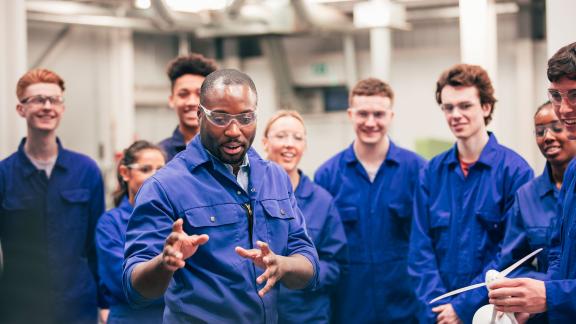How Leeds Teaching Hospitals NHS Trust is developing a healthcare science apprenticeship pipeline

We spoke to Victoria Maher, deputy team lead and specialist audiologist at Leeds Teaching Hospitals NHS Trust (LTHT) about expanding the trust's apprenticeship offering in audiology to attract new talent and develop staff.
Here at LTHT we introduced the Level 2 healthcare science assistant apprenticeship to develop a sustainable talent pipeline through the team.
Due to increased competition, it was no longer guaranteed that we would be able to recruit students who have completed an undergraduate healthcare science degree into the organisation and needed to look closer to home to boost recruitment. My team and I realised that by investing in apprentices we could develop our staff, support those with a passion for audiology, and benefit from the amount of valuable time apprentices spend with the team compared to a university student’s shorter placement.
Currently my team’s apprentices are a mixture of those who have wanted to develop their skills from administrative roles, and those who have been recruited externally.
Our apprentices enjoy the balance between their regular roles, a day spent in college and a half-day of further study time. This can include a 1:1 discussion with their mentor where their professional and personal development is discussed using a personal record plan designed by the department. This helps both the apprentice and their mentor or line manager keep a track of their successes and where their development needs are. They will then work together in making sure the appropriate training and support is given in that particular area.
Apprentices can also take advantage of the experience of other staff in the team to ask questions and make observations. The team also appreciate the support the apprentices bring to their roles, freeing up valuable time to focus on other tasks. We ensure the day spent in college is the same each week, which allows us to more effectively plan how to cover their duties whilst they are learning.
Should the apprentice require extra support and guidance from their college leaders this can be factored into their working week as appropriate. The apprentice and their work based assessor or mentor have regular meetings with the college to assess their progress and review their overall knowledge, skills and behaviours at the workplace.
On successful completion of their apprenticeships our apprentices rejoin the team as senior hearing care assistants paid at Band 3, with the opportunity to continue onto a Level 4 associate audiologist apprenticeship or after a slightly longer period of training become a hearing aid dispenser.
Our Level 4 apprentices are able to provide further support to other colleagues in the team, and the apprentice will have more indirect supervision, allowing them to run their own clinics such as hearing aid repairs, hearing aid fittings and patient advice workshops. We are hoping to expand this further to offer the Level 6 audiologist apprenticeship to provide a complete career pathway for those with an interest in audiology. Colleagues in our paediatric team are also interested in implementing a similar pathway in their area, providing another potential option for our apprentices. An apprentice could develop their audiology skills in both areas, giving them a valuable insight into where they might like to specialise at a later stage. Recently, we started to attend careers fairs. We discovered some students already had an understanding of audiology and are actively considering the huge variety of roles with the NHS.
Whilst we will continue with our school engagement, we are keen to offer opportunities to older students or those who might wish to switch careers. We started this approach to ensure that we have suitable staffing numbers given the difficulty of traditional recruitment. And we have been impressed with the enthusiasm of the apprentices, how well they have integrated into the team, and the potential of apprenticeships at all levels within the team, and now consider it a valuable part of our approach to recruitment.
Top tips
- Keep in mind that apprenticeships are not just for school leavers and can be attractive for those who want to explore a new career in healthcare science, including existing members of staff.
- Departments are more likely to retain staff through apprenticeships.
- Ensure you give time as an assessor of an apprentice to support their learning and development.
- Apprentices are learning hands-on throughout their training programme and offer stability to the team for the duration of their learning.
- Ensure you have a good link to the education institute providing the apprenticeship course.



